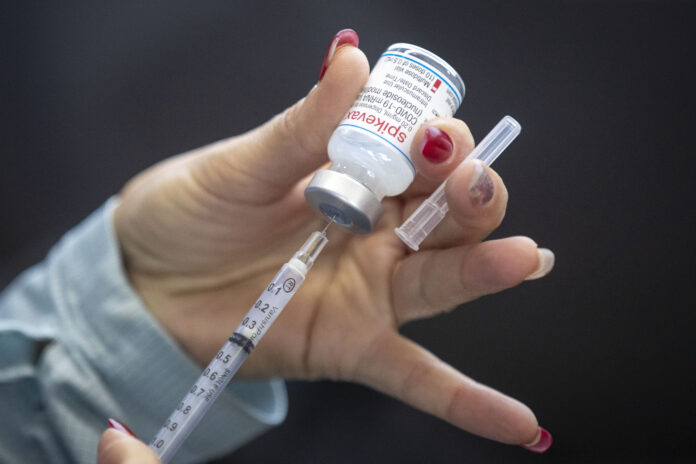Canadians should get vaccinated against COVID-19 and influenza to reduce the “danger” of needing other health measures this winter, Prime Minister Justin Trudeau says.
Speaking at an Ottawa-area event on Monday, Trudeau urged inoculation against the two respiratory viruses to protect the health-care system from dealing with preventable admissions.
“One of things to remember as flu season approaches is people got to get vaccinated, whether it’s getting the flu vaccine or getting up-to-date on your COVID shots,” he told reporters.
“There’s actually new formulations out now that cover both Omicron and the original strain of COVID, and we encourage everyone to get those vaccinations to keep pressure off of our hospitals, of our front-line heroes who are working so hard to keep people safe, but also keep pressures off of our economy and communities.
“If we’re able to get a high enough level of vaccination, it would reduce the danger of needing to take other health measures to make sure we’re all safe and not overloading our hospitals.”
The chances of getting infected with a respiratory illness increases indoors, health experts have said throughout the COVID-19 pandemic, and as more Canadians head inside for the winter, officials have been encouraging vaccination as the best way to stay protected.
The messaging comes at a time when vaccination rates for COVID-19 have stalled in Canada, and protective measures such as mask mandates have all but disappeared from Canadian society. Last month, Ottawa dropped its remaining COVID-19 measures at the border after easing them throughout the spring and summer — around the same time many provinces relaxed restrictions surrounding COVID-19.
Trending Now
‘The Watcher’: What we know about the menacing true story that inspired Netflix
Will bivalent boosters work against future COVID variants? Here’s what experts say
At that time, influenza numbers began to climb in the nation. After being shut out for close to two years, many health experts believed the measures Canadians learned during COVID-19 helped keep influenza at bay. Typically, Canada reaches the beginning of flu season from late October to early January, a Public Health Agency of Canada previously told Global News.
2:20
Health experts expect busier respiratory virus and influenza season
For weeks now, health officials have been urging for vaccination to protect the health-care system this winter. On Oct. 7, Health Canada approved Pfizer-BioNTech’s bivalent vaccine targeting Omicron and its sub-variants, BA.4 and BA.5. It was the second bivalent COVID-19 shot okayed in the country following Moderna’s shot, which was green lit for use in September.
The National Advisory Committee on Immunization (NACI) now “strongly” recommends COVID-19 bivalent vaccines to be given as boosters this fall over the original shots, which vaccine makers retooled to better target the ever-changing virus. At the same time, certain pharmacies have opened up their online portals to get Canadians in line for their flu shot when it becomes available in the respective region.
NACI has previously said COVID-19 shots and influenza jabs can be given at the same time for Canadians five years of age or older.
In an interview with The Canadian Press last Thursday, Ontario Chief Medical Officer of Health Dr. Kieran Moore, urged vaccination this winter.
“We really need it this year of all years because it’s going to be a complicated year, as we try to get back to normal living with all respiratory viruses this fall and winter,” he said.
— With files from The Canadian Press
© 2022 Global News, a division of Corus Entertainment Inc.



